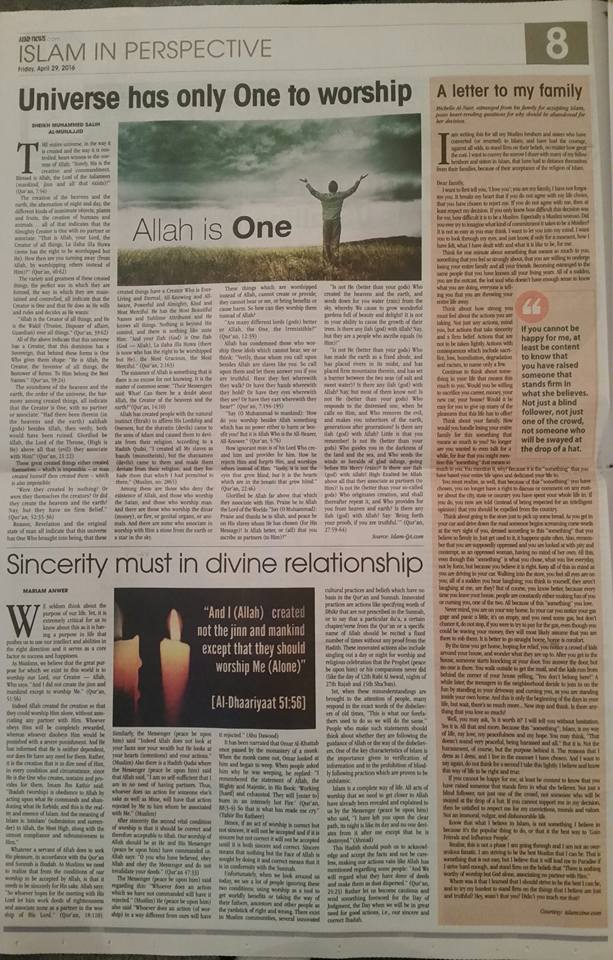The purpose of our life is a topic that we seldom think about or it is a discussion that is put aside after occasional brief reflection. But it is extremely critical for us to know about this topic as it is having a purpose in life that pushes us to use our intellect and abilities in the right direction and it serves as a core factor to success and happiness. As Muslims, we believe that the great purpose for which we exist in this world is to worship our Lord, our Creator – Allah, Who says: “And I did not create the jinn and mankind except to worship Me.” (Qur’an, 51:56)
Indeed Allah created the creation so that they could worship Him alone, without associating any partner with Him. Whoever obeys Him will be completely rewarded, whereas whoever disobeys Him would be punished with a severe punishment. And He has informed that He is neither dependant, nor does He have any need for them. Rather, it is the creation that is in dire need of Him, in every condition and circumstance, since He is the One who creates, sustains and provides for them. Imam Ibn Katheer said: “Ibaadah (worship) is obedience to Allah by acting upon what He commands and abandoning what He forbids; and this is the reality and essence of Islam. And the meaning of Islam is: ‘istislaam’ (submission and surrender) to Allah – the Most High – along with the utmost compliance and submissiveness to Him.”
Whatever a servant of Allah does to seek His pleasure, in accordance with the Qur’an and Sunnah is Ibaadah. As Muslims we need to realize that from the conditions of our worship to be accepted by Allah, is that it needs to be sincerely for His sake. Allah says: “So whoever hopes for the meeting with His Lord let him work deeds of righteousness and associate none as a partner in the worship of His Lord.” (Qur’an 18:110). Similarly, the Messenger (peace be upon him) said “Indeed Allah does not look at your faces nor your wealth but He looks at your hearts (intentions) and your actions.” (Muslim) Also there is a Hadeeth Qudsi where the Messenger (peace be upon him) said that Allah said, “I am so self-sufficient that I am in no need of having partners. Thus, whoever does an action for someone else’s sake as well as Mine, will have that action rejected by Me to him whom he associated with Me.” (Muslim)
After sincerity the second vital condition of worship is that it should be correct and therefore acceptable to Allah. Our worship of Allah should be as He and His Messenger (peace be upon him) have commanded us. Allah says: “O you who have believed, obey Allah and obey the Messenger and do not invalidate your deeds.” (Qur’an 47:33)
The Messenger (peace be upon him) said regarding this: “Whoever does an action which we have not commanded will have it rejected.” (Muslim) He (peace be upon him) also said “Whoever does an action (of worship) in a way different from ours will have it rejected.” (Abu Dawood)

It has been narrated that `Umar Al-Khattab once passed by the monastery of a monk. When the monk came out, `Umar looked at him and began to weep. When people asked him why he was weeping, he replied: “I remembered the statement of Allah, the Mighty and Majestic, in His Book: ‘Working [hard] and exhausted. They will [enter to] burn in an intensely hot Fire.’ [Qur’an 88:3-4] So that is what has made me cry.” (Tafsir Ibn Katheer)
Hence, if an act of worship is correct but not sincere, it will not be accepted and if it is sincere but not correct it will not be accepted until it is both sincere and correct. Sincere means that nothing but the Face of Allah is sought by doing it and correct means that it is in conformity with the Sunnah.
Unfortunately, when we look around us today, we see a lot of people ignoring these two conditions; using worship as a tool to get worldly benefits or taking the way of their fathers, ancestors and other people as the yardstick of right and wrong. There exist in Muslim communities, several innovated cultural practices and beliefs which have no basis in the Qur’an and Sunnah. Innovated practices are actions like specifying words of Dhikr that are not prescribed in the Sunnah, or to say that a particular du’aa, a certain chapter/verse from the Qur’an or a specific Name of Allah should be recited a fixed number of times without any proof from the Hadith. These innovated actions also include singling out a day or night for worship and religious celebration that the Prophet (peace be upon him) or his companions never did (like the day of 12th Rabi’ ul Awwal, nights of 27th Rajab and 15th Sha’ban).
Yet, when these misunderstandings are brought to the attention of people, many respond in the exact words of the disbelievers of old times, “This is what our forefathers used to do so we will do the same.” People who make such statements should think about whether they are following the guidance of Allah or the way of the disbelievers. One of the key characteristics of Islam is the importance given to verification of information and to the prohibition of blindly following practices which are proven to be unislamic.
Islam is a complete way of life. All acts of worship that we need to get closer to Allah have already been revealed and explained to us by the Messenger (peace be upon him) who said, “I have left you upon the clear path, its night is like its day and no one deviates from it after me except that he is destroyed.”(Ahmad) This hadeeth should push us to acknowledge and accept the facts and not be careless, making our actions vain like Allah has mentioned regarding some people: “And We will regard what they have done of deeds and make them as dust dispersed.” (Qur’an 25:23) Rather let us become cautious and send something foreword for the Day of Judgment, the Day when we will be in great need for good actions, i.e., our sincere and correct Ibaadah.
-Mariam Anwer
Originally Published at Arab News


